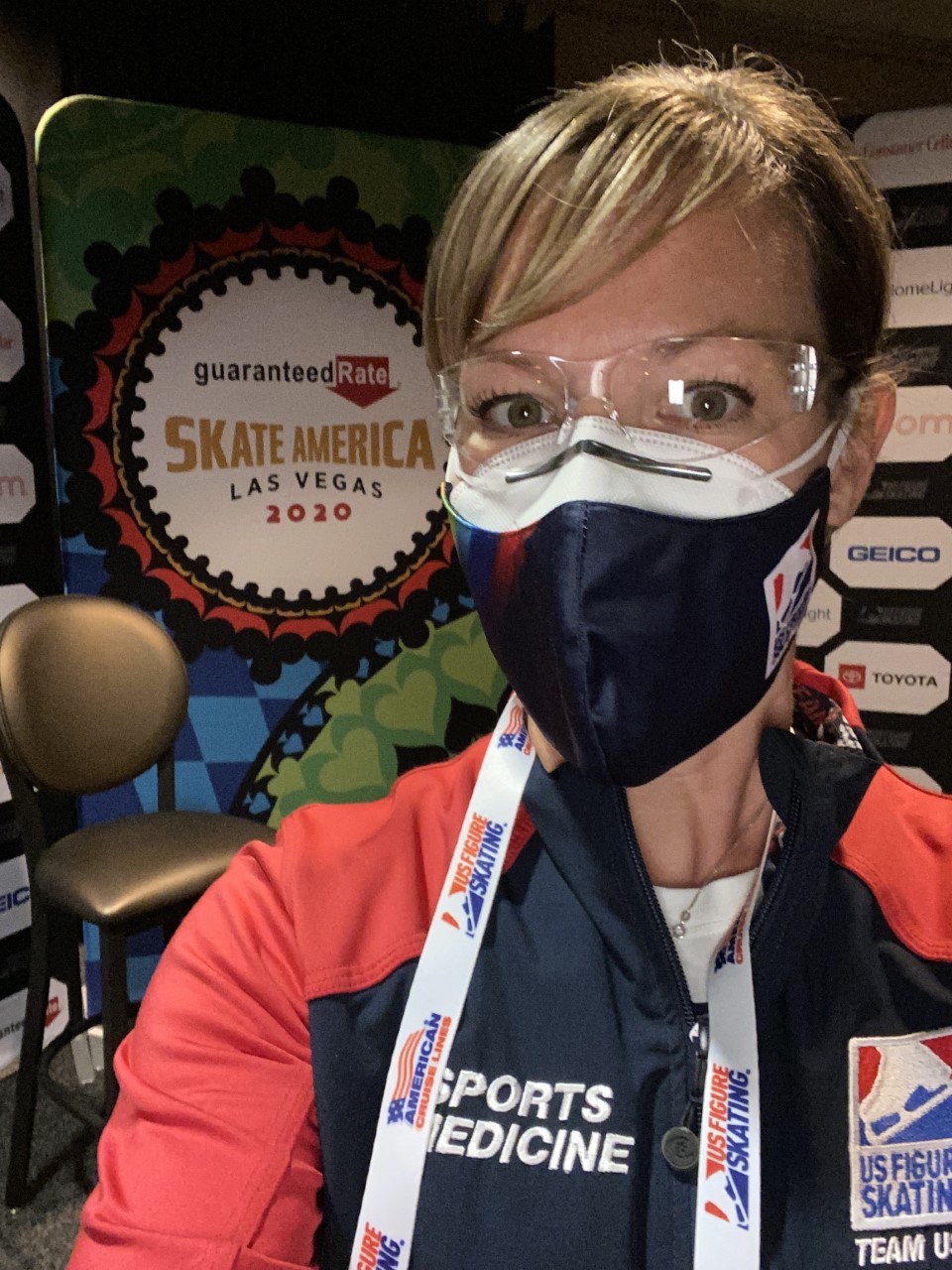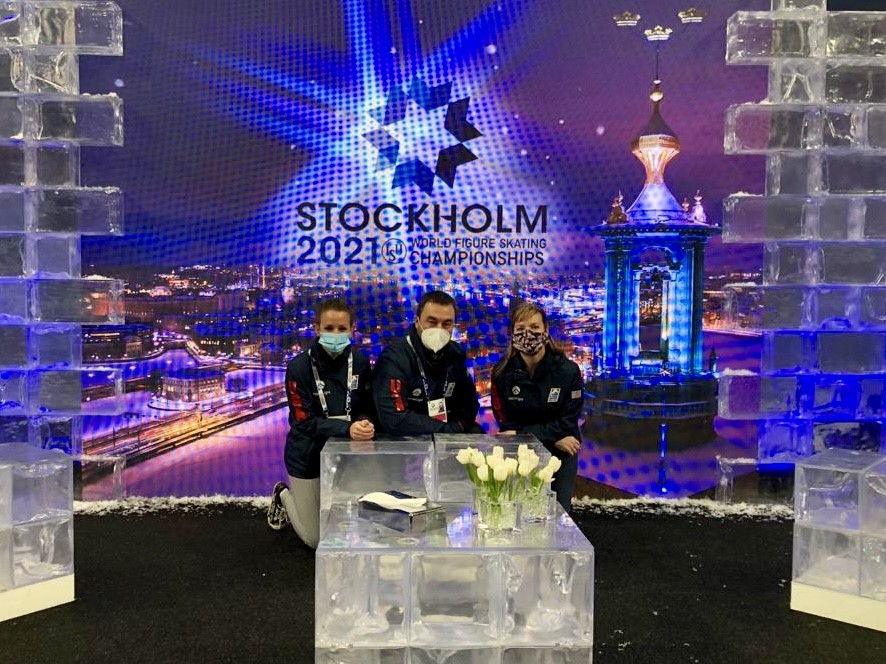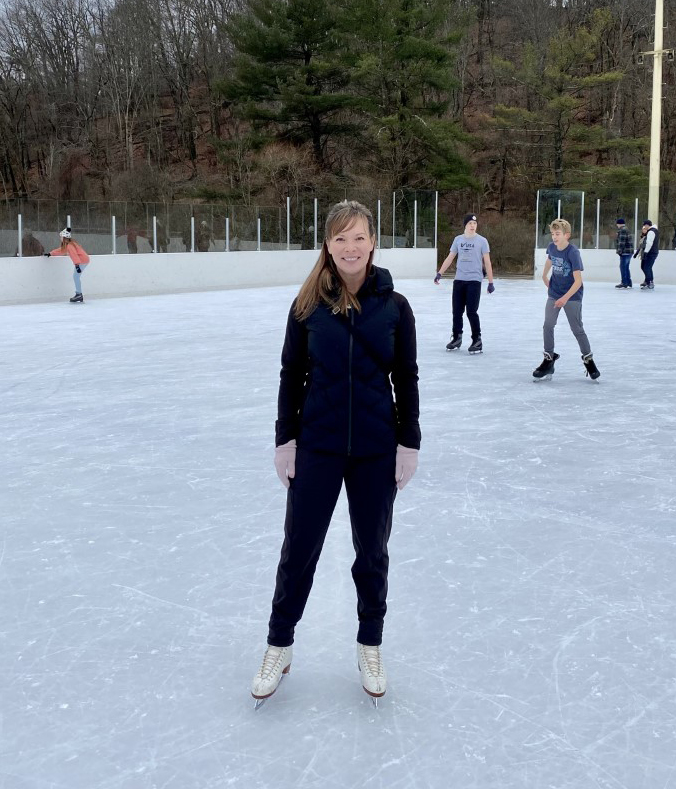
For the past few weeks, Gretchen Mohney has woken up at 4 a.m. to teach her Wayne State University class.
That’s because the director of WSU’s athletic training program in the College of Education is working virtually from Los Angeles while also helping the U.S. Figure Skating Medical Team prepare Olympic athletes for the 2022 Winter Olympics in Beijing, which will be held Feb. 4 through 20.
“I make modifications in my schedule to make it work. I get up early, teach my classes and then grade on evenings and weekends, when I just kind of have some downtime,” said Mohney, who coordinates COVID-19 risk management, education and safety for the U.S. Olympians. “It actually works out great because I can teach and then get to the athletes for whatever they need to get through the week. It’s learning to shift your workload in time to where you're at.”
Mohney’s original role as a consulting independent contractor with U.S. Figure Skating was supposed to see her coordinate the numerous health care providers the elite pool of American athletes required. As an athletic trainer, Mohney said her profession brings a lot to the table “because we are so multifaceted and trained in acute care management, injury prevention and assessment, risk mitigation, rehabilitation, and wellness management to recognize psychological distress and support care plans.”
But the pandemic, like everything else, changed all that. Mohney’s originally intended role morphed into her current COVID-19 risk management, education and safety coordinator position. With the added component, she has since been part of the sport’s original “bubbles” that included 2020 Skate America, the 2021 U.S. Figure Skating Championships in Las Vegas and the 2021 World Figure Skating Championships in Stockholm. She was most recently in Nashville for the 2022 U.S. Figure Skating Championships.
When skaters arrive in the “bubble,” they are met by staff, tested for COVID-19 and then guided back to their rooms, where they remain until their results come back. They’re not allowed to sightsee or eat with friends and family. In Los Angeles, Mohney personally transports some athletes to and from training sites to keep their contacts to an absolute minimum. “That has required coordination on a greater scale with other individuals in the area,” she said. “Rinks have donated their time and ability to come up with entrances that have minimal to no contacts, for example, so we can get athletes private ice time to train and then back to our modified bubble.”

If anyone breaks the bubble, they are out of competition. Mohney had to become a COVID expert almost overnight, learning different countries’ regulations, often in real time, when it came to border crossings and COVID-19.
“Every week, we were going somewhere different and I had to navigate the state rules, the country’s rules, and then we had the competition rules. Now we're going to go to Beijing, and I can tell you the plan has changed many times,” Mohney said. “Most recently, the omicron variant made its way into the scene in December and January and made things very challenging. We’ve used the word ‘pivot’ a lot because we have continually had to do so, in real time. I have, more or less, been that constant through the pivots.”
But having to shift focus on an evolving situation is not new for Mohney. When she first came to Wayne State in 2017, there was no athletic training program to speak of. When interviews began to be part of the newly created master’s program, Mohney jumped at the chance.
“I applied thinking I would just be a part of the program, but through my interview, I was actually asked to direct it,” she said. “After going back and forth on taking the opportunity, I said to myself that I’d see what I could do with this. For the first couple years, it was truly curriculum development, such as writing courses, hiring faculty and getting the program through the accreditation process, which is somewhat arduous.”

When the program finally received its accreditation, it also aligned with the pandemic’s beginning. This means Mohney has yet to graduate a class in person. But she said 100% of the program’s first two graduating cohorts are all employed somewhere in the metro Detroit area. The third cohort will graduate this spring, which Mohney hopes can be in person.
“Our former students are employed either in a sports medicine clinic and physician practice, a collegiate setting, a sports medicine equipment fitting company, or in an industrial setting ensuring workers receive injury prevention and response when they're on the line,” Mohney said. “I have many that are also working out in high schools and helping our youth. There are so many arms to our profession. I'm very proud of the alumni we have.”
Throughout her career in the professional world and in academia, Mohney said she has always strived to talk the talk and walk the walk.
“When I went into higher education as an athletic trainer, I was — and still am — very passionate that those who teach in the field also need to have relevance,” she said. “I don’t want to become what many will call a ‘paper trainer,’ which looks really good in the textbook but not in real-world situations. Those who are truly successful as an athletic trainer are able to be flexible. They’re able to bend to whatever the environment requires of them to provide the standard of care needed.”
Mohney also would like to see her most recent work with the U.S. Figure Skating Olympians find its way back to Wayne State.
“I truly hope that this is inspiring for our athletic training students and the program continues to grow,” Mohney said. “And I’m very, very appreciative of the support Wayne State University has given for me to be able to do all of the volunteer hours that I have done with the United States Olympic and Paralympic Committee and supporting Team USA. I hope that this makes them proud and shows some Warrior spirit.”
